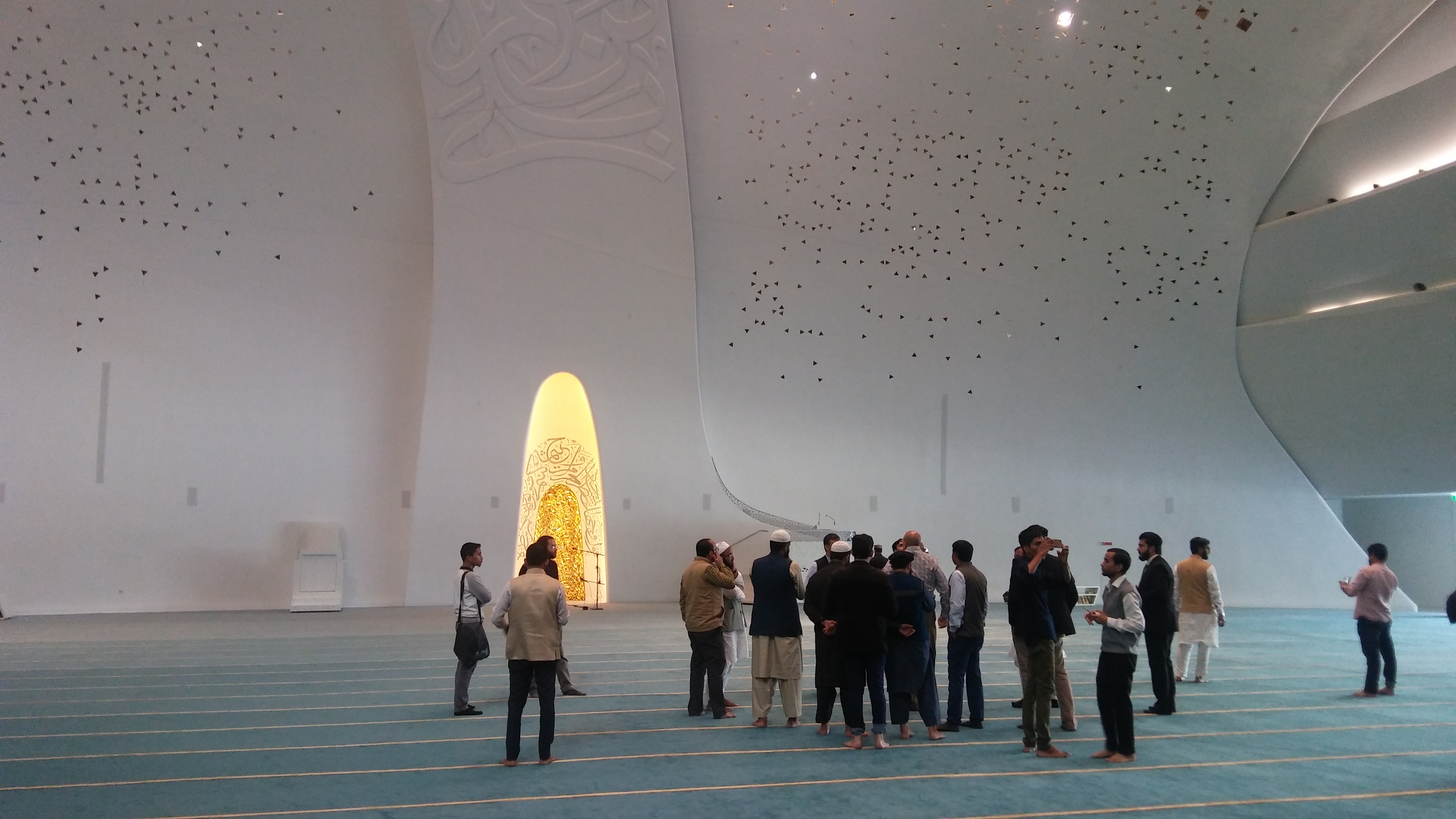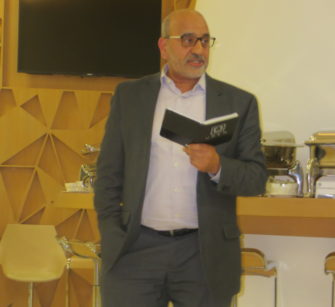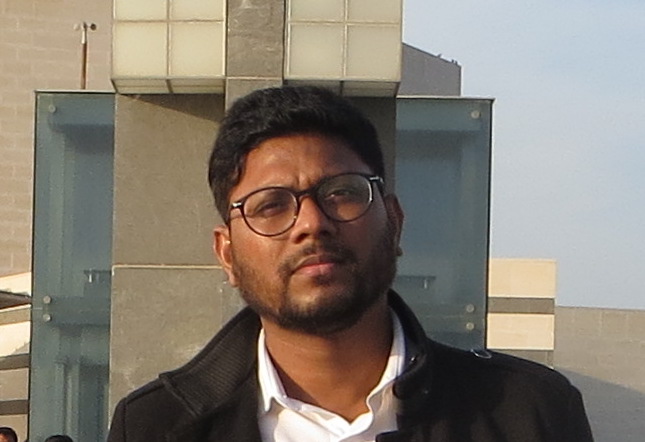
How can old tradition serve new knowledge creation? From a theological perspective, what happens when science begins to see human beings as it sees other animals, plants, and even inanimate matter? To ponder these and similar questions, the Madrasa Discourses project 2017 winter intensive invited about 50 madrasa students and faculty from India and Pakistan to Doha, Qatar. For six days we were exposed to serious and interesting lectures, discussions, dialogues, and workshops on translating Islam across cosmologies.
On the first day, Professor Mahan Mirza, Lead Faculty at the University of Notre Dame for the project, revealed the agenda for the next week: “Not to tell you what to think, but rather just to think!” He drew our attention to the two notions of dhikr (remembrance of Allah) and the verses of fikr (imagination) in the Qur’an. His discussion centered on contemporary theological challenges through which he helped us to understand the link between faith and science. This has been a subject of study since ancient times, addressed by theologians, philosophers, and now scientists. While previously overlapping categories, religious scholarship and the practice of observation and experimentation are now often seen as distinct, with some characterizing the relationship as one of conflict, others describing it as one of contrast, and others proposing convergence (see Haught 2012). On the subject of death and immortality, modern science and modern culture have an entirely different take on life and death as compared to Islamic religious perspectives. The former don’t think of death as a metaphysical mystery, and they certainly don’t view death as the source of life’s meaning. Rather, for many modern people death is a technical problem that we can and should solve. Humans always die due to some technical glitch, for example, the heart stops pumping blood, cancerous cells spread in the liver, etc. These are all technical problems. And every technical problem has a technical solution that in the future can or must be solved (Harari 2015, 22-23)! Students engaged in small group discussions in the late afternoons on various prompts created by Professor Mirza. For instance: “What approach (conflict, contrast, or convergence) between science and faith is acceptable?”“Will modern science succeed in solving the puzzle of death?” “How may a-mortality challenge theology?”
Hermeneutics, history, and tradition were discussed the next day by Professor Ebrahim Moosa, Primary Investigator of the Madrasa Discourses Project and Professor of Islamic Studies at the University of Notre Dame. His session included textuality in Muslim imagination from authority to metaphoricity, and the intimacy of language and thought in Islam. He emphasized the hermeneutic circle that refers to the idea that one’s understanding of the text as a whole is established by reference to the individual parts and one’s understanding of each individual part by reference to the whole. Neither the whole text nor any individual part can be understood without reference to one another, and hence, it is a circle. Modern hermeneutics includes both verbal and non-verbal communication as well as presuppositions, pre-understandings, and semiotics (Mir et al. 2015, 113; see also McNamara 1994). Several of the concerns that grew out of his lecture became prompts for the afternoon session: “Does the language we use correspond to reality?” “What is the role of culture in language production?” “Why is it so difficult to translate concepts from one language to another?”
The third day, Professor Deen Mohammed, professor at the Hamad Bin Khalifa University and originally from Sri Lanka, talked about ethics and the ‘ulamā’s role related to contemporary problems and upgrading the capacity of theologians. Dr. Mohammed, who studied in a madrasa and a Buddhist monastery, explicitly highlighted the importance of Muslim ideology and introduced us to the ideas of Ghazāli and Shahāb ad-Dīn Suhrawardī. We also had the opportunity to hear from Professor Mohamed Khalifa, an Arab scholar also from Hamad Bin Khalifa University, who drew our attention to several topics, including the harmony between Christianity and Islam; the causes underlying the rise and decline of Islamic communities; the impact of colonialism on the Muslim world; environmental and sustainable development; why the ’ulamā do not talk about science and technology in Jumu’ah khutba (Friday prayer speech); and why do we not translate relevant scientific developments from European languages to our local languages.
These class discussions spilt over into the dining hall, cafes, and field trips.
Bringing the winter intensive full circle, Professors Waris Mazhari and Maulana Ammar Nasir, Madrasa Discourses Project Lead Faculty from India and Pakistan, respectively, talked of language, scripture, and interpretation on the fourth day. Their lectures helped us to understand that we are not alone in trying to reconcile our experiences, understandings, and social realities with our interpretations of the wahy (revelation). Great Muslim scholars, like Ghazāli in the past, also made efforts to reconcile Aql (reason) and Naql (text) and while doing so even faced similar kinds of challenges. They resolved these according to the realities and sensibilities of their own space and time.
The program culminated on the fifth day with Professor Rana Dajani, who discussed teaching evolution in the Muslim world and her strategies to reconcile Sharia norms (Islamic divine law) with the evolving international consensus on human rights, views based on scientific discoveries, and human experiences. During her lecture she stated that the theory of evolution and Islamic ideas are not mutually exclusive.

The sixth day wrapped up the winter intensive with summary presentations by the students and concluding remarks by our instructors and mentors. Professor Moosa concluded the intensive with the Urdu couplet of the famous poet Shakeel Badayuni, inviting students to not fear foreign influences, but rather find strength in their ability and culture, and use this strength to good ends (own translation below):
Merā azm itnā buland hai ki parā-e sholoñ kā Dar nahīñ
Mujhe ḳhauf ātish-e-gul se hai ye kahīñ chaman ko jalā na de
(My confidence in self is strong; I’m unafraid of foreign flames
I’m scared those sparks may ignite, that in the blossom’s bosom lay)
After six days of intense material and discussion, we were both mentally and physically exhausted. Our stay in “Education City” was, beyond doubt, a journey to comprehend questions of theodicy such as “how do old traditions serve knowledge-creation in modernity?” and realize their answers. We learned that many old Muslim traditions have never been opposed to modernism, novelty, and fresh interpretation. Moreover, these traditions did realize and comprehend the call for change and they performed their interpretations according to their space and time. Now the ‘ulamā of today, learning from the past, must act the same in accordance with today’s space and time.
We benefited from a variety of constructive ideas. Even if the program ended here, it would still be considered a resounding success for the deep reflection and personal transformation it engendered in us. Truly, it was an unbelievable journey of six days in “Education City”, Qatar, which we by no means are likely to forget.

